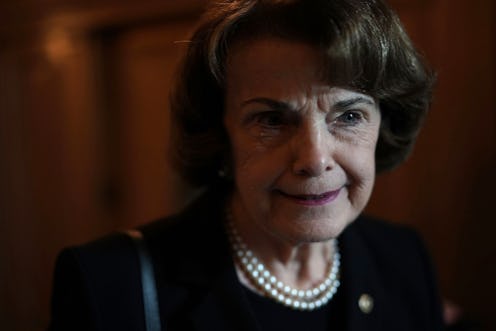News
Here's Who Could Run Up Against Dianne Feinstein In California's Pivotal 2018 Midterm

One of the Golden State's own democratic incumbents has predictably come out on top in the primaries for senator in the Golden State. But who will challenge Dianne Feinstein in California's 2018 midterms is a whole other story. In the primaries, there were 31 other candidates for senator, and though Feinstein was the clear frontrunner, the remaining votes were too close to make anything official. What's more, California's jungle primary system entails that the two candidates with the most votes (regardless of political party) will head to the official election. In other words, Feinstein might just be running against another democrat in November.
According to The Los Angeles Times, Feinstein was the clear and predicted frontrunner for the primaries, having served in the Senate for four full terms. At age 84, Feinstein is also the longest consecutively serving politician that represents California. Given that the Associated Press called her substantial lead early on Tuesday night, it's pretty clear that Feinstein is a favorite among California voters.
What's less clear, though, is which of the other senatorial candidates will claim the second spot and get the chance to challenge Feinstein this November. According to recent polling, there are two politicians who have most consistently shown up in that second place spot. One is a Republican, and one's a Democrat, which should make things pretty interesting.
Kevin de Leon, one of the candidates for second place, is the state's Senate President pro Tempore Emeritus, having served in the state Senate since 2010. This means he was the leader of the California State Senate, and was in charge of overseeing the progress of legislation in the house, the assignment of legislative bills, and the assigning of members to various committees, to name a few requirements of the position.
According to a recent poll conducted by Emerson College, de Leon was polling at around six percent of voters, which sounds terrible but is actually pretty good considering how many candidates were in the running. The New York Times estimates that he's won just over 10 percent of the vote so far, whereas Feinstein has won 44 percent.
That's the confusing thing about the jungle primary system in California: since so many people are allowed to run, it can often split up the vote into tiny percentages, so that the top candidates can "win" their spot in the primary with a percentage much less than 50%. For example, in this poll by Emerson College, Feinstein was polling a massive majority at 36%, with de Leon commanding a tie with Pat Harris for the second highest percentage at only 6%.
According to de Leon's website, his central issues include medicare for all, an emphasis on clean energy initiatives moving forward for the country, an increased focus on providing free and quality public education, and the need for "commonsense gun control," which he defines as an assault weapons ban, a required universal background check, and increased funding for gun violence research, to name a few key points.
The other strong competitor for the second spot in the primary is Republican James Bradley, according to a recent primary estimate by The New York Times. Bradley has collected approximately nine percent of the votes thus far, with de Leon collecting ten percent and Feinstein holding strong at 44 percent, according to the outlet.
As Bradley's site states, he is running a grassroots campaign (meaning no special interests, lobbyist or union donations or endorsements) and is a strict conservative on almost every issue. He is pro-life, supports the NRA (with no clear support of any new gun reform or legislation), supports Trump's border wall, and also supports the repeal of the Affordable Care Act.
Even though Bradley and de Leon are polling the "highest," the difference between the two was approximately 13,000 votes late Tuesday evening, which could change with final voting tallies. This basically means that the second spot for the primary might not be a total toss-up anymore. Even so, it's still unclear whether Feinstein will be competing against a fellow Democrat or a Republican in the 2018 midterms.